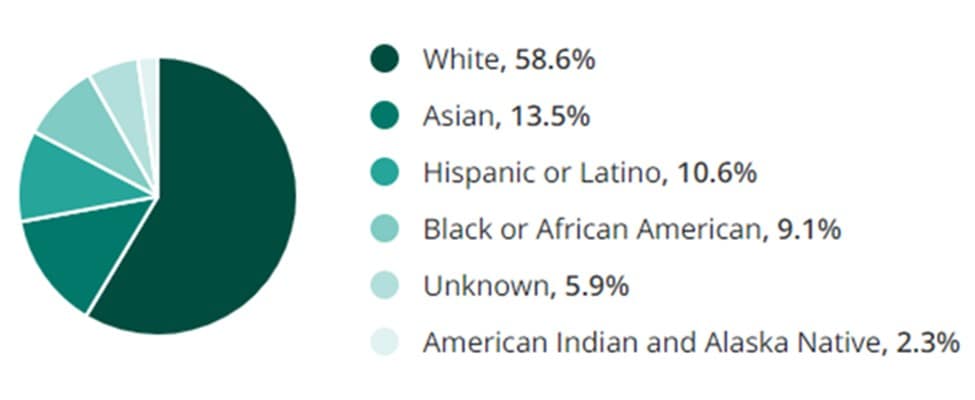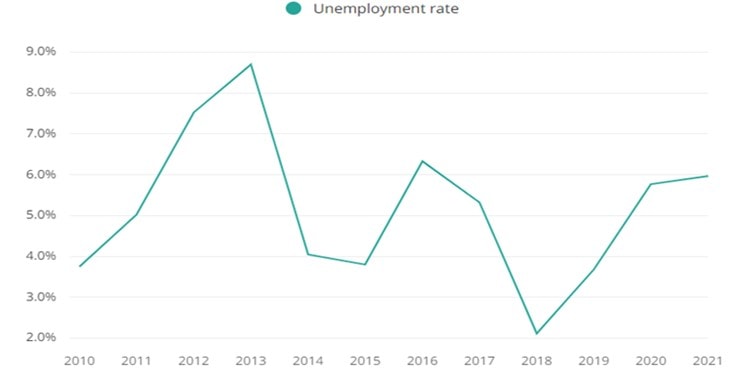Welcome to the ultimate guide for launching and advancing your career in biotech. The biotech industry is at the forefront of innovation, merging biology with technology to create breakthroughs in healthcare, agriculture, environmental sustainability, and more. Whether you’re a recent graduate eager to make your mark or a seasoned professional seeking new challenges, this guide provides the insights and resources you need to navigate the biotech jobs market.
Through this guide, you’ll gain an understanding of the educational paths that can lead to fulfilling biotech roles, explore the diverse areas of expertise within the field, and learn about the demographics of the workforce in the United States. We’ll also discuss salary and hiring trends, highlight the high-demand skills, and offer a glimpse into biotech jobs’ current and future outlook. Plus, we’ll address frequently asked questions and point you toward additional resources to further your career journey.
Your unique perspective can make a significant difference in a sector that thrives on diversity and innovation. Let’s embark on this journey together to discover where your biotech career can take you.
Educational Requirements
Aspiring professionals usually need a solid educational foundation in related fields to land biotech jobs. A bachelor’s degree in biotechnology, biology, chemistry, biochemistry, or molecular biology marks the starting point. For those aiming at more advanced roles, pursuing a master’s degree or Ph.D. becomes essential. While certifications aren’t always mandatory, they can significantly boost your qualifications, especially in specialized biotech jobs.
This educational journey equips you with the necessary scientific knowledge and prepares you to tackle challenges in diverse biotech nursing jobs and beyond. Whether it’s your initial step into entry-level biotech jobs or climbing toward more senior positions, the proper education can set a strong foundation for your career.
Areas of Expertise
The biotech sector offers many specializations, allowing professionals to dive into niches that match their interests and skills. Here are some critical areas of expertise:
- Agricultural Biotechnology: Focuses on modifying plants and animals to meet agricultural needs.
- Medical and Pharmaceutical Biotechnology: Deals with developing drugs, vaccines, and treatments.
- Industrial and Environmental Biotechnology: Uses microorganisms and enzymes for industrial production and environmental cleanup.
- Bioinformatics: Integrates biology, computer science, and information technology to analyze and interpret biological data.
- Bioprocessing: Involves using cells or biomolecules for products like vaccines, enzymes, or fuels.
- Regulatory Affairs: Manages regulatory aspects of bringing a biotech product to market.
- Quality Assurance/Quality Control: Ensures product safety and efficacy through rigorous testing and compliance.
The sector holds opportunities for a wide range of professionals, from biotech jobs in pharmaceutical biotechnology to specialists in bioinformatics. Embracing a particular area of expertise can help you stand out and excel in the competitive biotech job market.
Demographics in the United States
Ethnicity/Race:
The biotech industry in the U.S. strives for a workforce as diverse as its goals. Historically dominated by White professionals, efforts are ongoing to include more individuals from various ethnic backgrounds. This shift is driven by the understanding that diverse teams enhance innovation and better represent global markets.

Gender:
Gender distribution within biotech varies by role. Research and development positions are nearing gender parity, but male dominance is evident in leadership roles. Initiatives fostering female participation in scientific and executive positions are gradually reshaping the landscape.

Age:
Biotech attracts a wide age range of professionals. Young graduates often start in labs or as research associates, gaining valuable experience. Mid-career professionals and seasoned experts may occupy senior research roles or managerial positions, contributing their rich knowledge to the field.

Understanding these demographics highlights how the biotech sector values diversity. It’s a field that requires various skills and expertise and benefits significantly from the diverse insights brought by professionals from all walks of life.
Salary Trends
Salaries in biotech are as varied as the field itself, influenced by specialization, location, and experience level. Professionals in cutting-edge areas like genomics or personalized medicine often see higher earnings. Recent years have shown a steady upward salary trend, reflecting the growing demand for biotech advancements. Here are a few insights:
- Entry-Level Positions: Starting salaries for entry-level biotech jobs are competitive, providing a strong incentive for new graduates.
- Specialized Fields: Experts in specialized domains command top salaries, acknowledging their rare skills and the critical nature of their work.
- Leadership Roles: As with many industries, those in leadership positions like senior scientist jobs within biotech enjoy higher salaries, reflecting their experience and responsibilities.
The biotech industry’s salary growth signifies its robustness and the essential role it plays in advancing healthcare, agriculture, and environmental solutions. Those considering a career in this vibrant field can expect to find fulfilling work and financial rewards commensurate with their expertise and contributions. Staying informed about the latest fair compensation trends is crucial for job seekers and employers in fostering a motivating and equitable work environment.
Hiring Trends
The biotech sector is on a trajectory of rapid evolution, marked by several emerging fields gaining traction. This growth translates into an expanding landscape of employment opportunities. Here are the prominent hiring trends shaping the industry:
- Emerging Technologies: Innovations in CRISPR technology, synthetic biology, and bioinformatics are creating demand for experts in these areas.
- Global Health Challenges: The ongoing need for advancements in virology, vaccine development, and personalized medicine highlights the importance of specialized knowledge.
- Remote Opportunities: With technology enabling more flexible work environments, remote biotech jobs are becoming increasingly available, allowing for a wider talent pool.
These trends indicate the resiliency and dynamic nature of the biotech industry and its role as a critical player in addressing global health and environmental challenges. For those seeking scientist biotech jobs or specialized roles, staying current on these trends can provide crucial insights into where the industry is headed and where opportunities lie.

Education Levels
The level of education needed in the biotech sector varies significantly based on the role and specialization. Here’s a breakdown:
- Research and Development: A Ph.D. or Master’s degree is often required for these roles, as they involve leading-edge research and development activities.
- Technical Positions: Positions such as lab technicians or bioprocessing operators may require a Bachelor’s degree in a relevant field.
- Sales, Marketing, and Administrative Roles: These roles typically require a Bachelor’s degree, with an MBA being a plus for leadership positions.
Continual learning is a cornerstone in the biotech industry. Keeping current with the latest scientific discoveries and technological advancements is crucial for progress and career advancement. For professionals at every education level, the sector offers opportunities for growth, learning, and contribution to the field’s future developments.
Skills in Demand
The biotech industry seeks a multifaceted skill set to address its challenges and opportunities. Here are the skills currently in high demand:
- Data Analytics: The ability to analyze and interpret large sets of biological data is crucial, especially in fields like genomics and bioinformatics.
- Molecular Modeling: Knowledge of molecule structures is invaluable for drug discovery and development.
- Laboratory Equipment Proficiency: Hands-on experience with advanced laboratory equipment is essential for many research and development roles.
- Regulatory Knowledge: Understanding the complex regulatory environment is critical for compliance, regulatory affairs, and product development roles.
- Soft Skills: Collaboration, communication, and critical thinking are essential, given the interdisciplinary and collaborative nature of biotech work.
Whether you’re eyeing remote biotech jobs or in-person positions, equipping yourself with these skills can dramatically increase your marketability and impact in the biotech sector.
Current & Future Biotech Jobs Outlook
The biotech industry is poised for unprecedented growth, driven by rapid technological advancements and an increasing focus on personalized medicine, environmental sustainability, and food security. Here’s what the future holds:
- Job Growth: The demand for biotech professionals is expected to surge, with new companies and startups emerging to address global challenges.
- Innovation and Investment: Continued investment in research and development promises a steady stream of innovation, further fuelling job creation.
- Interdisciplinary Opportunities: The intersection of biotech with fields like AI, data science, and environmental science is creating new roles that call for multidisciplinary expertise.
This optimistic outlook offers both new entrants and seasoned professionals ample opportunities to contribute to transformative work that advances their careers and profoundly impacts society. Whether exploring entry-level biotech jobs or leadership positions, the field promises a dynamic and rewarding career path.
FAQ’s
What degree do I need to work in biotech?
Most biotech roles require at least a bachelor’s degree in biotechnology, biology, chemistry, or a related field. Advanced positions may need a Master’s or Ph.D.
Are biotech jobs in high demand?
Yes, the biotech industry is snowballing, with high demand for research, development, regulatory affairs professionals, and more.
Can I work in biotech without a science degree?
While many roles require a science degree, there are positions in sales, marketing, HR, and administration that may not. Skills and experience in these areas can be valuable.
Is biotech a good career choice?
Biotech offers a rewarding career with opportunities to contribute to groundbreaking work that can make a significant difference in health, agriculture, and the environment.
How can I stay updated on biotech industry trends?
Following reputable industry publications, attending conferences, and participating in professional networks are excellent ways to keep abreast of the latest trends.
Additional Resources
To further your career in biotech, consider exploring the following resources:
- Biotech Careers offers information on educational paths, internships, and various job areas within biotech.
- Pathways to Science provides internship listings and information on STEM programs, supporting students in pursuing science careers.
- The O*NET OnLine and the U.S. Bureau of Labor Statistics are excellent sources for detailed salary data, job growth projections, and descriptions of biotech roles.
These resources offer valuable insights and support for anyone looking to advance their career in biotechnology’s dynamic and impactful field.
Conclusion
The journey toward a successful career in biotech is filled with opportunities for innovation, growth, and making a tangible impact on society. There’s much to consider, from understanding the educational requirements to exploring the various areas of expertise and keeping abreast of the latest hiring and salary trends. Embracing continuous learning and developing in-demand skills can set you apart in this dynamic field.
We encourage you to join the Diversity Employment platform. By doing so, you support our mission and become part of job search websites that can significantly enhance your career prospects in the biotech industry and beyond. Here, you can post your resume, discover new opportunities, and connect with employers committed to diversity and inclusion.
Whether you’re just starting with entry-level biotech jobs or a seasoned professional, the biotech industry offers a diverse range of rewarding career paths. Let us be your resource at every step of your career journey.




